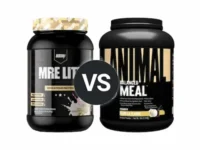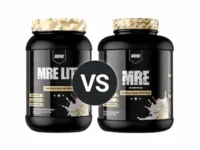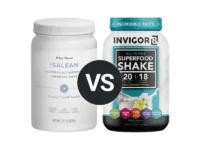Knowledge BaseYou're Questions Answered
Is protein powder a good meal replacement for weight loss?
Protein powder can be an effective component of a meal replacement strategy for weight loss, but its suitability depends on how it is used and the overall nutritional balance it provides. While protein powder offers a convenient and high-quality source of protein, a meal replacement should also deliver a balanced mix of nutrients, including carbohydrates, fats, vitamins, and minerals. Below, we explore the benefits and considerations of using protein powder as a meal replacement for weight loss.
Benefits of Protein Powder as a Meal Replacement
1. Convenience and Portion Control
One of the primary benefits of using protein powder as a meal replacement is convenience. It is quick and easy to prepare, making it an ideal option for busy individuals. Protein powder can help with portion control by providing a consistent amount of calories and nutrients per serving, which is beneficial for those monitoring their caloric intake1.
2. High Satiety and Appetite Control
Protein is known for its high satiety, meaning it can help you feel full for longer periods. This can reduce overall calorie intake by curbing hunger and preventing overeating. Using protein powder in a meal replacement shake can help manage appetite, making it easier to adhere to a calorie-restricted diet for weight loss2.
3. Supports Lean Muscle Mass
Maintaining lean muscle mass is important during weight loss, as muscle tissue burns more calories than fat tissue. Protein powder provides a high-quality source of protein, rich in essential amino acids, which support muscle maintenance and growth. This is especially beneficial when combined with resistance training3.
Considerations and Limitations
1. Nutritional Balance
While protein powder provides a significant amount of protein, it is generally low in other essential nutrients, such as fiber, healthy fats, vitamins, and minerals. A complete meal replacement should include a balanced mix of macronutrients and micronutrients. To create a more balanced meal replacement, protein powder should be combined with other ingredients like fruits, vegetables, nuts, seeds, and healthy fats4.
2. Potential for Nutritional Deficiency
Relying solely on protein powder for meal replacement without considering the broader nutritional needs can lead to deficiencies in essential nutrients. For long-term weight loss and overall health, it's crucial to ensure that meal replacements provide a well-rounded nutrient profile5.
3. Variety and Palatability
Consuming the same protein shake repeatedly can lead to taste fatigue, making it challenging to stick to a meal replacement regimen. It's important to vary the ingredients and flavors to keep the diet enjoyable and sustainable.
4. Caloric Considerations
While protein powder can help control calorie intake, it is important to ensure that the meal replacement shake is not too low in calories. Extremely low-calorie diets can lead to metabolic slowdown and loss of muscle mass, which can hinder weight loss efforts in the long run6.
- Leidy, H. J., Carnell, N. S., Mattes, R. D., & Campbell, W. W. (2007). Higher protein intake preserves lean mass and satiety with weight loss in pre-obese and obese women. Obesity, 15(2), 421-429.
- Westerterp-Plantenga, M. S., Lemmens, S. G., & Westerterp, K. R. (2012). Dietary protein–its role in satiety, energetics, weight loss and health. British Journal of Nutrition, 108(S2), S105-S112.
- Phillips, S. M. (2014). A brief review of higher dietary protein diets in weight loss: A focus on athletes. Sports Medicine, 44(2), 149-153.
- Gibney, M. J., Lanham-New, S. A., Cassidy, A., & Vorster, H. H. (2009). Introduction to human nutrition. John Wiley & Sons.
- Mahan, L. K., & Raymond, J. L. (2016). Krause's food & the nutrition care process. Elsevier Health Sciences.
- Heymsfield, S. B., & Wadden, T. A. (2017). Mechanisms, pathophysiology, and management of obesity. New England Journal of Medicine, 376(3), 254-266.

Your Answer
We are a participant in the Amazon Services LLC Associates Program, an affiliate advertising program designed to provide a means for us to earn fees by linking to Amazon.com and affiliated sites.



